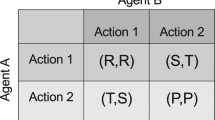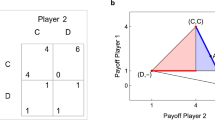Abstract
We test the intuitively plausible suggestion that collective action is more easily achieved if cooperation is necessary to avoid losses compared to the situation where cooperation is necessary to increase gains. An experiment using different 2-person repeated Prisoner’s Dilemmas as a simple example of a collective action situation was conducted and refutedthis suggestion.
The order of authorship is pseudo-randomized. Useful suggestions and comments by Norman Braun, Bernd Lahno, and Jeroen Weesie are gratefully acknowledged. Financial support was provided by the Netherlands Organization for Scientific Research (NWO) under grant PGS 50-370.
Access this chapter
Tax calculation will be finalised at checkout
Purchases are for personal use only
Preview
Unable to display preview. Download preview PDF.
Similar content being viewed by others
References
Brewer, M. B., & Kramer, R. M. (1986). Choice Behavior in Social Dilemmas: Effects of Social Identity, Group Size, and Decision Framing. Journal of Personality and Social Psychology, 50, 3, 543–549.
Camerer, C. F., Johnson, E. J., Rymon, T. & Sen, S. (1993). Cognition and Framing in Sequential Bargaining for Gains and Losses. Pp. 27–47 in: Frontiers of Game Theory, edited by K. Binmore, A. Kirman & P. Tani. Cambridge, MA: MIT Press.
Colman, A. (1982). Game Theory and Experimental Games. Oxford: ergamon Press.
Kahneman, D. & Tversky, A. (1979). Prospect Theory: An Analysis of Decision under Risk. Econometrica, 47, 263–291.
Komorita, S. S. & Carnevale, P. (1992). Motivational Arousal vs. Decision Framing in Social Dilemmas. Pp. 209–223 in: Social Dilemmas: Theoretical Issues and Research Findings, edited by W. B. G. Liebrand, D. M. Messick & H. A. Wilke. Oxford: ergamon Press.
Lindenberg, S. (1988). Contractual Relations and Weak Solidarity: The Behavioral Basis of Restraints on Gain-maximization. Journal of Institutional and Theoretical Economics, 144, 39–58.
Murnighan, J. K. & King, T. R. (1992). The Effects of Leverage and Payoffs on Cooperative Behavior in Asymmetric Dilemmas. Pp. 163–182 in: Social Dilemmas: Theoretical Issues and Research Findings, edited by W. B. G. Liebrand, D. M. Messick & H. A. Wilke. Oxford: ergamon Press.
Rapoport, A. (1974).Prisoner’sDilemma — Recollections and Observations. Pp. 17–34 in: Game Theory as a Theory of Conflict Resolution, edited by A. Rapoport. Dordrecht: Reidel.
Rapoport, A., Guyer, M. J. & Gordon, D. C. (1976). The 2×2 Game. Ann Arbor, Mich.: University of Michigan Press.
Raub, W. & Snijders, C. (1995). Gains, Losses, and Cooperation in Social Dilemmas: The Effects of Risk Preferences. Mimeo. Available from the authors.
Thaler, R. H. (1992). The Winner’sCurse. Paradoxes and Anomalies of Economic Life. New York: Free Press.
van Lange, P. A. M., Liebrand, W. B. G., Messick, D. M. & Wilke, H. A. (1992) Introduction and Literature Review. Pp. 3–28 in: Social Dilemmas: Theoretical Issues and Research Findings, edited by W. B. G. Liebrand, D. M. Messick & H. A. Wilke. Oxford: ergamon Press.
Wälder, A. G. (1994) Implications of Loss Avoidance for Theories of Social Movements. Mimeo. Harvard University.
Author information
Authors and Affiliations
Editor information
Editors and Affiliations
Rights and permissions
Copyright information
© 1996 Springer-Verlag Berlin Heidelberg
About this paper
Cite this paper
Snijders, C., Raub, W. (1996). Does “The Motivating Power of Loss” Exist? An Experimental Test of the Effect of Losses on Cooperation. In: Liebrand, W.B.G., Messick, D.M. (eds) Frontiers in Social Dilemmas Research. Springer, Berlin, Heidelberg. https://doi.org/10.1007/978-3-642-85261-9_12
Download citation
DOI: https://doi.org/10.1007/978-3-642-85261-9_12
Publisher Name: Springer, Berlin, Heidelberg
Print ISBN: 978-3-642-85263-3
Online ISBN: 978-3-642-85261-9
eBook Packages: Springer Book Archive




